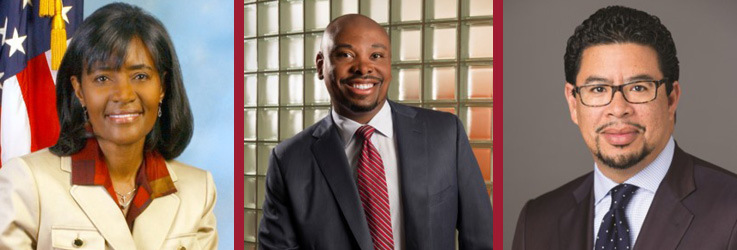Spots are still available for Indiana University of Pennsylvania's “Diversity, Equity and Inclusion in a Professional Workplace” virtual event on March 17 from 1:30 to 4:00 p.m.
Sponsored by IUP's Social Equity and Title IX Office and the IUP Division of University Advancement, the program will feature three professionals, including two IUP graduates, discussing preconceptions about diversity and inclusion.
 Panelists include: Debra Evans-Smith, IUP '81, deputy assistant director (retired), Federal Bureau of Investigation; James E. Taylor, chief diversity, inclusion, and talent management officer at UPMC; and Mauro Wolfe, IUP '90, attorney and partner, Duane Morris, LLP, New York City.
Panelists include: Debra Evans-Smith, IUP '81, deputy assistant director (retired), Federal Bureau of Investigation; James E. Taylor, chief diversity, inclusion, and talent management officer at UPMC; and Mauro Wolfe, IUP '90, attorney and partner, Duane Morris, LLP, New York City.
This virtual event includes the panel discussion from 1:30 to 2:30 p.m., moderated by Elise Glenn, IUP Chief Diversity and Inclusion officer/Title IX coordinator. Breakout sessions will be offered from 2:30 to 3:30 p.m. with a concluding discussion from 3:40 to 4:00 p.m.
The program is free and open to all; preregistration is required.
This event was originally scheduled in March 2020, but was postponed due to COVID-19 restrictions.
The Breakout Sessions
Debra Evans-Smith has held a number of roles in her 30-year tenure with the FBI, including a joint duty position as chief of the Counterespionage Group at the CIA in the Senior Executive Service; as special assistant to former FBI Director Robert Mueller III; as special agent in charge, Washington Field Office; and work in the Counterintelligence Division where she was responsible for all counterintelligence and espionage matters in Washington, DC and Northern Virginia. Following her retirement in 2014, she returned to the FBI in 2015 and served in the Office of Diversity and Inclusion until her final departure in 2019. Smith currently serves on IUP's President's Commission for Diversity and Inclusion and the IUP Alumni Board of Directors.
The breakout panel offered with Evans-Smith is “Getting Out of Your Comfort Zone in Practicing Professionalism in Law Enforcement.” She will discuss diversity in law enforcement and the importance of increasing diversity in this profession. She will also talk about excessive use of force and issues related to this topic.
James E. Taylor is both chief diversity and inclusion officer and chief talent management officer at UPMC, one of the nation's largest and most successful integrated health care delivery and finance systems. He will be honored as a DEI Champion at the 2021 National Diversity and Leadership Council event in April.
His breakout session, “Diversity, Equity, and Inclusion Initiatives in the Healthcare Industry and Addressing Inequities in Healthcare Services,” will address a number of questions and topics, including:
- Our nation has seen much societal, racial, and political unrest. What do you make of what occurred this past year until now, and what do you see as the way forward? Is there possibility for healing, or is this beginning of further societal unrest?
- Inequity in health care (and most other institutions) is repeatedly documented. For example, the ongoing COVID-19 pandemic has highlighted the disparate access to health care and treatment that many minority communities receive. Is UPMC attempting to address inequities in health care services and, if so, how are they doing this?
- Black Americans are dying of COVID-19 three times faster than white Americans. With vaccines starting to circulate, and Black Americans not showing confidence and urgency in getting the vaccine, how would you suggest the message be shared in the Pittsburgh area that the vaccinations are safe for all, given the context of historical issues that have fostered distrust?
- Many of our students will go on to work with an increasingly diverse workforce, even though some students might readily identify as coming from very small and homogenous communities. From a human resources perspective, what should students strive to know to assist them with successful integration into the workforce? Are there any specific issues, such as persistent negative stereotypes ethnic or racial groups, that you deal with regularly?
- How does UPMC address DE&I in advanced employee learning? Would you mind sharing some of the diversity initiatives that you have created at UPMC? Can you cite examples as to how these policies benefit both employees and patients?
- If diversity had a voice, what would it say about what is going on in our world today?
Mauro Wolfe practices in the area of litigation, with a focus on domestic and international white-collar matters before the US Department of Justice, the US Securities and Exchange Commission, the New York Department of Financial Services, Financial Industry Regulatory Authority and many other agencies, as well as corporate investigations and complex litigation. Since 2009, Wolfe has been a member of the highly selective and prestigious New York Council of Defense Lawyers, an organization comprising the most well-regarded white-collar practitioners in New York.
Wolfe's breakout session, “Top Five Secrets to Successfully Benefiting from Corporate Diversity Programs,” is geared to both diverse and non-diverse students.
For diverse students, he will lead a discussion titled “Diversity programs are designed to give you a chance at bat, but you have to be proactive,” and for non-diverse students, the discussion will center on “Diversity programs are designed to help you become more self-aware and open to different points of view.” He will also raise a number of points: competency is the floor, not the ceiling; cultural flexibility; understanding the importance of interpersonal skills to thrive; a high EQ is more important than a high IQ; the importance of developing powerful relationships, mentors, advisors, and networks; and be constructive (avoid self-isolation and selection and general gripe sessions, and are diversity programs group therapy)?